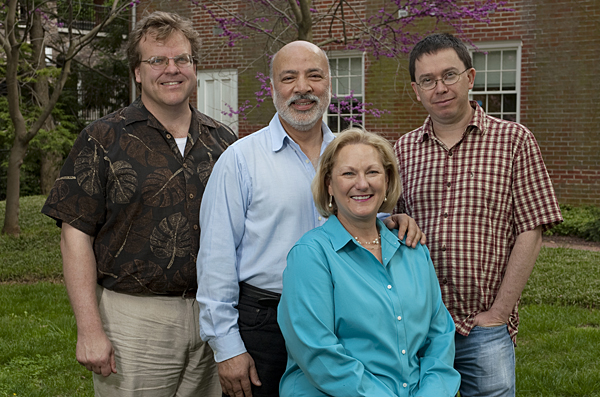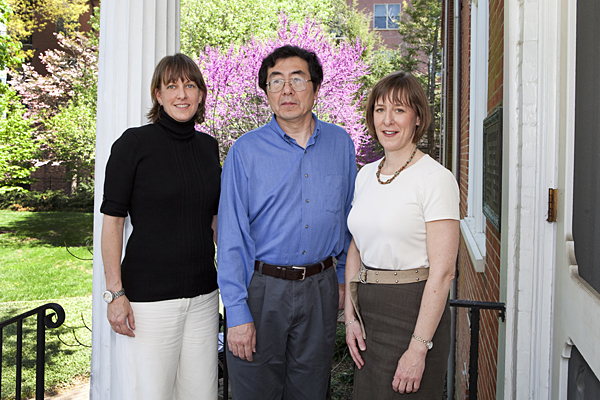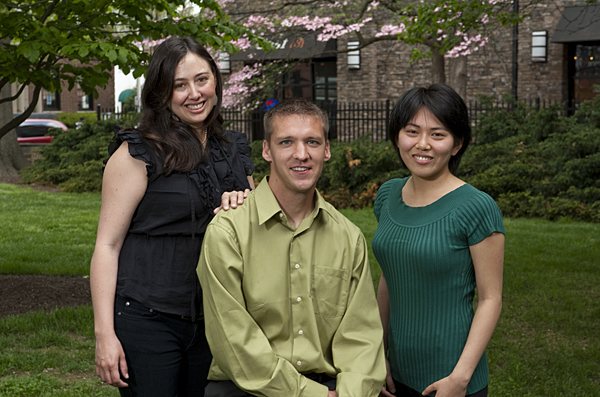


Excellent teaching and advising
Seven faculty recognized for outstanding teaching, advising
9:12 a.m., May 10, 2011--Seven members of the University of Delaware faculty have been recognized for their outstanding work in teaching and advising, and three graduate teaching assistants have received awards for excellence in teaching. The Excellence in Teaching and Excellence in Undergraduate Advising and Mentoring awards were presented at the May 9 meeting of the Faculty Senate.
Excellence in Teaching Awards are based primarily on nominations from current and past students. Each winner receives $5,000, has his or her portrait hung in Morris Library for five years and has a brick, inscribed with his or her name, installed in Mentors' Circle, between Hullihen Hall and the Morris Library.
Honors Stories
National Medal of Science
Warren Award
This year's Excellence in Teaching Awards were presented to Robert Scott Coulter, associate professor of mathematical sciences; Bernard McKenna, assistant professor of English; Michelle Provost-Craig, associate professor of kinesiology and applied physiology; and Ismat Shah, professor of materials science and engineering and physics and astronomy.
UD's Excellence in Advising and Mentoring Award is based on student nominations, and recipients each receive $2,500 and are honored with an inscribed brick in Mentors' Circle.
Honored this year were Jingguang Chen, who is Claire D. LeClaire Professor of Chemical Engineering; Stephanie Kotch, instructor in the School of Education; and Lynn Worden, assistant professor of human development and family studies.
Each recipient of the graduate student Excellence in Teaching Awards receives $1,500. This year's honorees are Lauren Marie Balasco of Exeter, R.I., who is pursuing a doctorate in the Department of Political Science and International Relations; Paul Robert Larson from Maple Grove, Minn., who is completing his doctorate in economics; and Miho Maeda of Oakland, N.J., who is a master's degree student in the Department of Biological Sciences.
UDaily asked this year's honorees to share their thoughts about teaching and advising. Their responses are printed below.
Excellence in Teaching
Robert Scott Coulter: "I teach in pure mathematics; specifically, discrete mathematics, abstract algebra and cryptography. All of these courses attempt to develop problem-solving skills but with emphasis on exact reasoning involving abstract concepts. In practical terms, this means that in lower level courses, the aim is generally to develop the fundamentals of accurate reasoning, while in higher level courses the aim becomes one of honing those skills to the point where the student can reason deeply and accurately."
Bernard McKenna: "I teach a range of classes from graduate courses in Modernism and Irish studies to advanced undergrad courses, like Tolkien and Caribbean lit, to survey classes. I learned the power a teacher has for good and ill as a boy in Baltimore. I won't share the ill, but I saw the good in the work of my aunt, Joan Oleski, who taught in Baltimore City Public Schools for years. We would be together in a store or at a mall and former students would come up to her and hug her and tell her she changed their lives. I learned to admire and respect my students while teaching at Miami-Dade College. I primarily worked with Cuban refugees, who wrote about their experiences in essays for class. I learned that not all students have those same experiences but that they all have struggles and all are heroic in their own way. I became a "professional" at UD, learning about Problem-Based Learning. I had worked a lot from instinct earlier in my career and PBL helped me develop a professional program based on my instincts but also on PBL."
Michelle Provost-Craig: "I teach courses in exercise physiology, 12-Lead electrocardiogram interpretation and a pre-professional seminar class that prepares students to apply to graduate schools. My teaching philosophy is very simple: Make learning interesting, individualized and rigorous. I make it a point to get to know each student by name regardless of class size. Students have commented that it makes our class of 100 seem small and personal. In addition, I use real life examples that are pertinent to the field of physical therapy and other allied health professions since the majority of our students intend to go on for graduate education in some form of health care. Using Sakai, UD Capture, sending out review points prior to each class by email and holding review sessions outside of class also helps me connect with students. But, perhaps, what really inspires students to do well is that I genuinely want them to learn the material, and they know it. Consequently, I find myself going out of my way to engage them and the result is they are willing to go the extra mile in studying, coming to class, going to review sessions and being actively engaged in the learning process. I believe the Department of Kinesiology and Applied Physiology has some of the best students in the University and it is a privilege for me to get to teach and mentor them."
Ismat Shah: "My mother was a school teacher. She used to say that you do not teach to a dot, you teach a line. Students are a continuum and have a past and future associated with them. You affect their future by your teaching, but the knowledge of their past is essential in being an effective teacher. She used to basically know every single student in her class. Although it is difficult to completely incorporate my mother's philosophy with increasing class sizes, I do the best I can to come close to it. Good knowledge of the subject is essential but being a good communicator is just as important, and communication requires knowing your audience and listening to their needs. Most of the time the utterance is nonverbal. One has to be sensitive to other signals. How do you do that to a class of 50 - 100 students? In Pakistan, where my mother taught, she had classes of 100 - 200 students."
Excellence in Advising and Mentoring
Jingguang Chen: "I'm interacting with undergrads mainly as their research adviser. My philosophy on advising is to first identify the education background and research interest of an individual student. I will then choose a research topic that matches his/her interest. During the course of research, I provide guidance but strongly encourage the student to work independently. Many of the undergraduates from my group went on to top graduate schools. Two of my former undergraduate students won the prestigious Goldwater Fellowship, the highest honor for engineering undergraduate students."
Stephanie Kotch: "As an elementary teacher education (ETE) instructor and field experience coordinator, my primary goal is to nurture and support undergraduate teacher candidates striving to discover themselves as professional teachers. I assist the teacher candidates in making career choices and support their curiosities about the profession. This may include additional classroom visitations, guided research and/or simple conversation. I attempt to support the teacher candidates throughout their initial methods field experiences. The true nature of today's demanding classroom is often shocking and unnerving to many teacher candidates. To a novice teacher nothing is trivial. Every issue is relevant and a potential stress. It is my role to nurture the teacher candidates, provide ample time to discuss issues, make them aware that I am available to them at all times. They need to be reassured and provided with confidence to continue their journey. I have the added benefit of working with my teacher candidates for three consecutive semesters in the Vertical Model of Field Experience. After a year of working with the teacher candidates as methods students, it is my intent that they feel confident going into their student teaching placement. There is still much to be learned and experienced, but it is my goal that they approach the field experience with a strong foundation. My instructional process continues by providing quality placements, consistent supervision, constructive feedback, opportunities to extend and build upon previously learned skills, opportunities to reflect and to set professional goals. I maintain high expectations for my teacher candidates. With continued support they will accomplish their goal of becoming not just a teacher, but an effective, confident and competent educator who will positively impact students' learning."
Lynn Worden: "When I meet with students, I try to give them the guidance that I would want my own children to receive. I make sure that they understand their options and the policies they must follow so they can graduate in a timely manner. However, I also want them to be in control of their academic and future careers. I expect them to take responsibility for following up on issues we have discussed and encourage them to make their own choices about courses, minors, majors and other opportunities at UD. Sometimes, when a student graduates, I realize that I met them when they came to visit UD for a recruitment event. It gives me extreme satisfaction to witness their growth and development from being a high school student to becoming a college graduate and new professional."
Excellence in Teaching by graduate students
Lauren Marie Balasco: "The past two courses I've served as a teaching assistant (T.A.) for are constitutional law and introduction to law. As a T.A, it is my responsibility to help students get to that place where they can proudly submit their work with honor and integrity to the instructor for final assessment, which means helping to create an environment where they feel comfortable to ask questions, seek guidance and allow me to review their work. It also means that students confidently submit their work knowing they exercised their utmost potential while spending the appropriate time, energy and resources on a given assignment."
Paul Robert Larson: "While a student is at UD, I believe he or she should be learning how to think, ask and answer questions, and contribute to society. I define success in my economics class as learning how to learn and demonstrating that ability by learning economics. I think I'm successful because I design assignments that reward organized thinking using economists' methods. This -- designing assignments to reward thinking and using economists' approaches to problems -- is not easy, and I know that some very intelligent students have been frustrated by my methods. On the other hand, I have had many students exceed their own expectations by accepting that learning how to think pays dividends in learning core material. I interpret this award to mean that current and former students are appreciating the learning opportunities I have provided, and this is a wonderful feeling."
Miho Maeda: "I am currently T.A.ing an introduction to biology lab. In most subjects, especially in the sciences, the introductory classes are important as bases to build up on. I feel that many students who enroll in the introductory biology class only see it as a hurdle to jump over, and not as the stepping-stone that it really is. Therefore, when I hear from my students that they not only retained the knowledge from class, but can utilize it, I feel a sense of accomplishment."
Photos by Kathy F. Atkinson and Ambre Alexander










